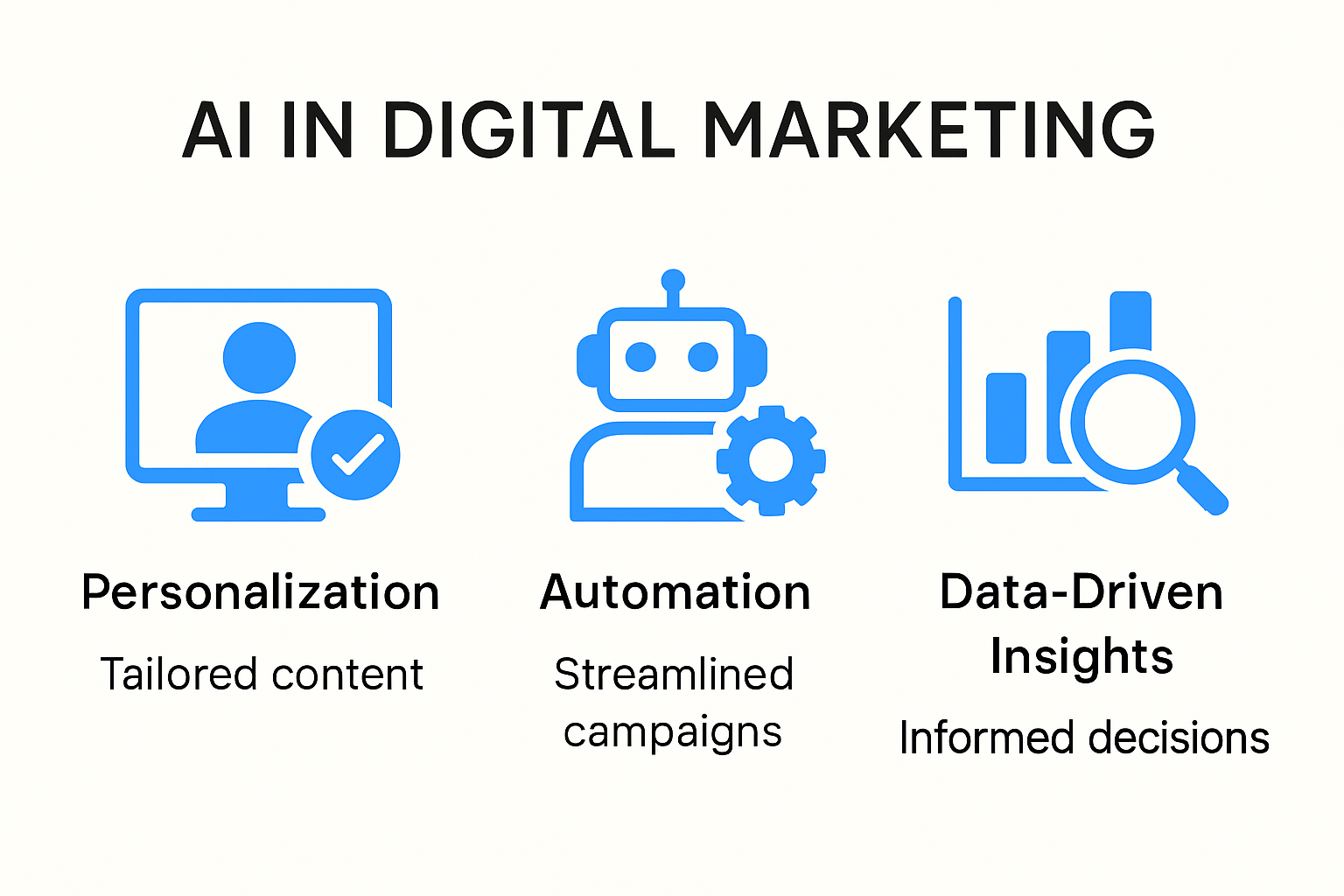AI is turning digital marketing on its head. Personalised campaigns, automated workflows, and sharp data insights are no longer science fiction. But one fact stands out. A massive 59 percent of global marketers now see AI-powered personalisation as the most critical trend for customer engagement. It sounds futuristic, right. Yet, the real surprise is that the winners in 2025 will not just be those using AI, but those who handle it with ethical responsibility and a smart strategy.
Table of Contents
- AI Tools Transforming Digital Marketing
- Personalised Customer Experience With AI
- AI-Powered Data Analysis And Insights
- Best Practices For Implementing AI In Marketing
Quick Summary
| Takeaway | Explanation |
|---|---|
| AI Personalization is Essential | Businesses must leverage AI for hyper-targeted marketing to effectively engage customers. |
| Automate Marketing for Efficiency | AI can streamline repetitive tasks, allowing marketers to focus on strategy and creativity. |
| Ethics Must Guide AI Adoption | Companies need to prioritize data privacy and transparency when implementing AI technologies. |
| Continuous Learning is Key | Ongoing education and training in AI are crucial for marketing professionals to stay competitive. |
| Use Predictive Analytics Effectively | Implementing predictive analytics can help businesses anticipate customer behaviours and market changes. |
AI Tools Transforming Digital Marketing
Artificial intelligence is rapidly reshaping the digital marketing landscape, offering unprecedented capabilities for businesses to connect with audiences more effectively. As technology evolves, AI tools are becoming essential instruments for marketers seeking to gain competitive advantages in an increasingly complex digital ecosystem.

Intelligent Personalization and Targeting
AI is revolutionizing how businesses approach customer engagement through advanced personalization techniques. According to IE Business School, machine learning algorithms are now capable of analyzing massive datasets to create hyper-targeted marketing experiences. These sophisticated systems can predict customer behaviour, segment audiences with remarkable precision, and deliver content that resonates on an individual level.
For instance, AI-powered recommendation engines can analyse a user’s browsing history, purchase patterns, and demographic information to suggest products or services with incredible accuracy. This level of personalization goes beyond traditional marketing approaches, enabling businesses to create more meaningful connections with potential customers.
Automated Marketing Processes and Efficiency
Research from edX highlights how AI systems are transforming marketing workflows by automating repetitive tasks and freeing up human resources for strategic initiatives. Natural language processing and machine learning algorithms can now handle complex tasks such as:
- Content Generation: AI tools can draft social media posts, email campaigns, and basic marketing copy
- Customer Service: Intelligent chatbots provide 24/7 customer support and initial query resolution
- Data Analysis: Automated systems quickly process and interpret large volumes of marketing data
- Campaign Optimization: Real-time performance tracking and automated adjustments to marketing strategies
These capabilities represent a significant shift in how marketing teams operate, allowing professionals to focus on creative strategy and high-level decision-making rather than mundane administrative tasks.

Ethical Considerations and Future Implications
Comprehensive research from SpringerLink emphasizes the importance of understanding the ethical dimensions of AI in digital marketing. While these technologies offer immense potential, businesses must navigate complex considerations around data privacy, algorithmic bias, and transparent communication.
Successful implementation of AI tools requires a balanced approach that combines technological innovation with human oversight. Marketers must remain vigilant about maintaining ethical standards, ensuring that AI-driven strategies respect user privacy and provide genuine value.
As AI continues to evolve, businesses that strategically integrate these tools will be best positioned to create more responsive, efficient, and personalized marketing experiences. The key lies not just in adopting AI technologies, but in understanding how to leverage them thoughtfully and effectively.
Personalised Customer Experience with AI
In the rapidly evolving digital marketing ecosystem, AI is transforming how businesses understand and engage with their customers. Personalisation has shifted from a competitive advantage to an absolute necessity, with AI technologies enabling unprecedented levels of customer understanding and tailored interactions.
Dynamic Customer Journey Mapping
According to Nielsen’s 2025 global marketing survey, 59% of global marketers now view AI-powered personalisation as the most critical trend for customer engagement. AI algorithms can now track and analyse customer interactions across multiple touchpoints, creating comprehensive and dynamic customer journey maps that adapt in real-time.
These advanced systems go beyond traditional demographic segmentation. By leveraging machine learning, businesses can now predict individual customer preferences, anticipate needs, and design highly contextual experiences. For example, an e-commerce platform might dynamically adjust product recommendations based on a user’s browsing history, past purchases, and even emotional state inferred from interaction patterns.
To highlight how AI personalises customer interactions across touchpoints, the table below summarises key AI-driven personalisation features and their benefits:
| AI Personalisation Feature | Description | Benefit |
|---|---|---|
| Dynamic Recommendations | Suggests products/services based on user behaviour and preferences | Higher conversion rates |
| Adaptive Content Delivery | Alters website/email content in real-time based on user actions | More relevant customer experiences |
| Predictive Customer Insights | Anticipates customer needs and preferences | Improved customer satisfaction |
| Sentiment Analysis | Infers emotional state from interactions | Deeper emotional engagement |
| Contextual Engagement | Delivers content based on time, location, and user context | Increased relevance and resonance |
Real-Time Personalisation and Predictive Insights
Research from the Boston University Digital Business Institute highlights how AI enables companies to tailor interactions at an unprecedented scale. Intelligent systems can now:
- Adaptive Content Delivery: Modify website content, email messaging, and advertising in milliseconds based on user behaviour
- Predictive Recommendations: Generate hyper-personalised product suggestions with remarkable accuracy
- Emotional Intelligence: Detect user sentiment and adjust communication tone accordingly
- Contextual Engagement: Provide relevant information based on time, location, and current user context
This level of personalisation transforms customer interactions from generic experiences to meaningful, individualised conversations that build genuine connection and trust.
Ethical Considerations in AI-Driven Personalisation
Insights from the University of Chicago Booth School of Business underscore the critical importance of responsible AI implementation. While personalisation technologies offer immense potential, businesses must navigate complex ethical landscapes.
Key ethical considerations include protecting consumer privacy, preventing algorithmic bias, and maintaining transparency in data usage. Successful AI personalisation strategies must balance technological capabilities with robust ethical frameworks that prioritise user trust and consent.
As AI continues to evolve, the most successful businesses will be those that view personalisation not just as a technological challenge, but as an opportunity to create genuinely meaningful, respectful customer relationships. The future of digital marketing lies in leveraging AI to understand and serve individual customer needs with unprecedented precision and empathy.
AI-Powered Data Analysis and Insights
Data has become the lifeblood of modern digital marketing, and artificial intelligence is transforming how businesses extract meaningful insights from increasingly complex information landscapes. AI-powered analytics tools are revolutionizing the way marketers understand, predict, and respond to customer behaviours and market dynamics.
Advanced Customer Segmentation and Predictive Modeling
According to Harvard’s Division of Continuing Education, machine learning algorithms have dramatically enhanced the precision of customer audience segmentation. These sophisticated systems can now analyse multiple data dimensions simultaneously, creating nuanced customer profiles that go far beyond traditional demographic categorizations.
AI-driven analytics can integrate behavioural data, purchase history, social media interactions, and even sentiment analysis to create multidimensional customer understanding. This allows businesses to develop hyper-targeted marketing strategies that speak directly to specific customer segments with unprecedented accuracy.
Real-Time Data Processing and Actionable Insights
Research from Smargasy Inc. reveals how AI-driven analytics tools process massive data volumes to uncover actionable marketing insights. These intelligent systems can:
- Predictive Lead Scoring: Identify potential customers most likely to convert
- Customer Behaviour Forecasting: Anticipate purchasing patterns and preferences
- Performance Optimization: Continuously analyse marketing campaign effectiveness
- Competitive Intelligence: Track and interpret market trends in real-time
To clarify the capabilities of AI-powered analytics, the following table summarises key functions and their impacts on digital marketing:
| AI Analytics Capability | Description | Marketing Impact |
|---|---|---|
| Predictive Lead Scoring | Ranks leads by likelihood to convert | Focuses efforts on high-value customers |
| Customer Behaviour Forecasting | Anticipates future buying actions | Improves timing of marketing campaigns |
| Performance Optimization | Analyses and adjusts campaign effectiveness in real-time | Maximises ROI and campaign efficiency |
| Competitive Intelligence | Monitors competitors and market trends | Helps stay agile and ahead of the market |
By transforming raw data into strategic intelligence, AI enables marketers to make faster, more informed decisions that directly impact business performance.
Predictive Analytics and Future Forecasting
UpRango highlights the remarkable capabilities of machine learning in predicting future market trends and customer behaviours. Predictive analytics go beyond historical data analysis, using sophisticated algorithms to:
- Project potential sales trajectories
- Identify potential customer churn risks
- Recommend proactive marketing interventions
- Estimate future resource requirements
These predictive capabilities represent a quantum leap in marketing strategy, allowing businesses to move from reactive approaches to proactive, data-driven decision-making.
As AI technologies continue to evolve, the boundary between data analysis and strategic planning becomes increasingly blurred. Businesses that effectively leverage these intelligent systems will gain significant competitive advantages, transforming raw data into powerful strategic insights that drive growth and innovation.
Best Practices for Implementing AI in Marketing
Implementing AI in digital marketing requires a strategic, thoughtful approach that balances technological innovation with ethical considerations. As businesses increasingly adopt AI technologies, understanding and applying best practices becomes crucial for successful and responsible implementation.
Strategic AI Integration and Alignment
According to the Edelweiss Applied Science and Technology study, successful AI implementation begins with strategic alignment. Marketing teams must carefully evaluate how AI tools can address specific business challenges and complement existing marketing strategies. This involves conducting comprehensive audits of current marketing processes, identifying areas where AI can add the most value, and developing a clear roadmap for technology integration.
Key considerations include assessing technological infrastructure, understanding team capabilities, and establishing clear performance metrics. Businesses should start with pilot projects that demonstrate tangible benefits, allowing for iterative learning and gradual scaling of AI technologies.
Ethical AI and Responsible Implementation
Stanford University’s AI Guidelines emphasize the critical importance of ethical AI deployment. Responsible implementation requires:
- Transparency: Clearly communicating AI use to customers and stakeholders
- Data Privacy: Implementing robust data protection mechanisms
- Bias Mitigation: Developing diverse and representative training datasets
- Human Oversight: Maintaining human judgment and intervention capabilities
Marketing teams must develop comprehensive governance frameworks that ensure AI technologies are used responsibly, protecting both customer interests and business reputation. This includes regular audits of AI systems, ongoing monitoring for potential biases, and maintaining clear lines of accountability.
Continuous Learning and Skill Development
The University of Nebraska-Lincoln highlights the importance of continuous education and skill development in AI implementation. Successful AI integration requires more than technological investment it demands a cultural shift within marketing teams.
Organizations should invest in:
- Regular training programs on AI technologies
- Cross-functional collaboration between marketing and technical teams
- Workshops on ethical AI use and emerging technological trends
- Developing internal AI literacy and competence
Marketing professionals must develop a hybrid skill set that combines traditional marketing expertise with technical understanding of AI technologies. This approach ensures that human creativity and strategic thinking remain at the core of marketing efforts, with AI serving as a powerful enhancement tool.
As AI continues to evolve, businesses that approach implementation with strategic vision, ethical considerations, and a commitment to continuous learning will be best positioned to leverage these transformative technologies. The future of digital marketing lies not in replacing human expertise, but in creating powerful synergies between human creativity and artificial intelligence.
Frequently Asked Questions
What is AI-powered personalisation in digital marketing?
AI-powered personalisation refers to the use of artificial intelligence to create highly tailored marketing experiences for customers. This involves analysing vast amounts of data to predict customer behaviour and preferences, enabling businesses to deliver content that resonates with individual users.
How can AI automate marketing processes?
AI can automate repetitive marketing tasks such as content generation, customer service interactions through chatbots, data analysis, and campaign optimisation. This allows marketing teams to focus more on strategic and creative activities rather than administrative tasks.
What are the ethical considerations when using AI in marketing?
Companies must consider data privacy, algorithmic bias, and transparency in their AI implementations. It is crucial to establish ethical frameworks that respect customer rights and maintain trust in AI-driven marketing practices.
Why is continuous learning important for AI in marketing?
Continuous learning is vital as AI technology evolves rapidly. Marketers must stay updated on new tools and ethical considerations, ensuring they can effectively integrate AI into their strategies while maintaining human insight and creativity.
Bring AI-Powered Marketing to Life with Proven Solutions
Reading about the complex world of AI in digital marketing reveals just how crucial personalisation, automation, and data-driven decisions have become. If your biggest challenge is transforming these trends into tangible results for your business, you are not alone. Many businesses face the very real struggle of turning deep customer insights and predictive analytics into stronger engagement and growth. The article highlights the need for ethical AI tools and continuous upskilling, but having the right technical partner is just as vital for making these innovative ideas a daily reality.
With Cloudfusion’s web design and development solutions, you can move from theoretical strategies to concrete outcomes. Our team delivers bespoke digital platforms built to harness advanced AI personalisation, robust automation, and seamless integration with your campaigns. Let us help you align your website or app with the future of customer engagement backed by transparent, ethical processes. Ready to unlock AI-driven growth and lasting digital impact? Visit Cloudfusion today to request a custom consultation tailored to your marketing goals.








